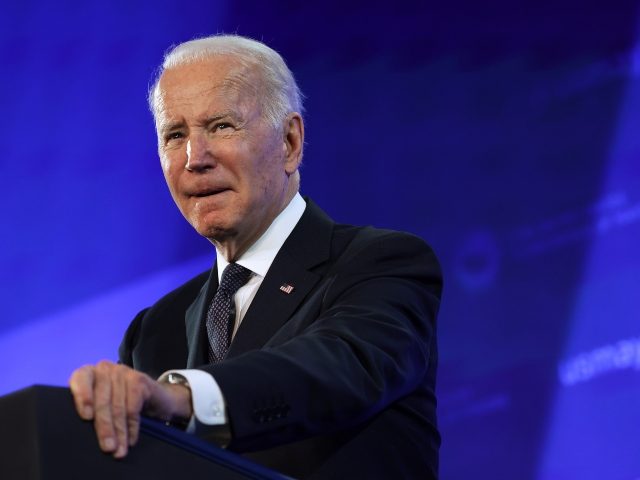President Joe Biden is expected in his State of the Union speech to indirectly rebuke Democrats and business allies who tout wage-cutting migration as a cure for inflation.
The White House released portions of Biden’s draft speech, which says:
We have a choice. One way to fight inflation is to drive down wages and make Americans poorer. I have a better plan to fight inflation. Lower your costs, not your wages. Make more cars and semiconductors in America. More infrastructure and innovation in America. More goods moving faster and cheaper in America. More jobs where you can earn a good living in America. And, instead of relying on foreign supply chains – let’s make it in America.
Biden’s comments do not mention immigration. But for months, pro-migration business lobbies and Democrats have been pushing their claim that inflation should be reduced by adding more wage-cutting immigrants.
The Democrats’ top advocate for amnesty and migration, Sen. Dick Durbin (D-IL), backed the migration-for-inflation argument on December 2, according to a Bloomberg reporter: “Asked if immigration parole proposal in [the pending Build Back Better bill] would decrease inflation, Durbin says ‘Oh most certainly … If there are more workers filling those jobs, it’s deflationary.’”
“As the United States continues to experience historic labor shortages contributing to inflation and driving up costs for families, FWD.us analysis below shows that immigration relief could help address these shortages and curb inflationary trends,” said a December 12 report by FWD.us, an investor-funded pro-migration group.
“If we can alleviate the worker shortage [with migration], it might be the fastest thing to do to impact inflation,” said Suzanne Clark, the CEO of the Chamber of Commerce, said mid-January. “We need more workers. We should welcome people who want to come here, go to school and stay … we do believe it would be anti-inflationary.”
The policy argument shows the divide between Biden’s East Coast wing of Democratic left-wing advisors and his West Coast wing of allied business lobbies and far-left progressives.
Biden has zig-zagged between the two groups, just like the many other politicians who zig-zag between voters and donors.
He has backed the West Coast wing’s demand for loose immigration policies that have spiked the inflow of wage-cutting migrants throughout 2021, while he has also sided with his East Coast faction by calling for a tight labor market that would raise wages.
Biden explained his support for the long-standing and very popular goal of a tight labor market in a May 28 speech:
Rising wages aren’t a bug; they’re a feature. We want to get — we want to get something economists call “full employment.” Instead of workers competing with each other for jobs that are scarce, we want employees to compete with each other to attract work. We want the — the companies to compete to attract workers.
[…]
Well, wait until you see what happens when employers have to compete for workers. Companies like McDonald’s, Home Depot, Bank of America, and others — what do they have to do? They have to raise wages to attract workers. That’s the way it’s supposed to be.
A YouGov poll in February showed that Americans overwhelmingly oppose the Democrats’ proposal to curb price inflation by adding more cheap-labor migrant workers to the U.S. economy.
The February 12-15 poll asked 1,500 citizens: “Do you think the following measures intended to reduce inflation are a good idea or a bad idea? …. Increase immigration to reduce worker shortages?”
In the YouGov poll, the strongest support for the cheap-labor plan came from liberals (49 percent), Biden voters (45 percent), college graduates (32 percent), and people who earn more than $100,000 (37 percent).
The strongest opposition came from people without college degrees (63 percent), people who are 65 and over (56 percent), Republicans (78 percent), conservatives (78 percent), and rural voters (53 percent).
The wealth-shifting extraction migration policy is very unpopular, according to a wide variety of polls.
The polls show deep and broad public opposition to labor migration and the inflow of temporary contract workers into jobs sought by young U.S. graduates. The opposition is growing, anti-establishment, multiracial, cross-sex, non-racist, class-based, bipartisan, rational, persistent, and recognizes the solidarity that Americans owe to one another.

COMMENTS
Please let us know if you're having issues with commenting.